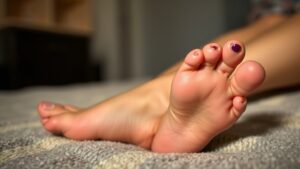Itchy feet at night can be frustrating and disruptive, making it hard to relax or sleep. Several factors could be behind this annoyance, from dry skin and allergies to fungal infections or stress. Sometimes, the cause is simple, like irritation from harsh soaps or tight socks. Other times, it signals a condition needing attention, like eczema or athlete’s foot. Comprehending the basis of the problem is the initial step toward finding relief—and getting back to peaceful nights.
Common Causes of Itchy Feet at Night
Several factors can cause feet to itch at night, disrupting sleep and resulting in frustration. Poor hygiene, like infrequent washing or wearing dirty socks, allows sweat and bacteria to build up, irritating the skin.
Hot environments, such as warm bedrooms or thick bedding, increase sweating, which can trigger itching. Allergic reactions to fabrics, detergents, or skincare products might also worsen at night when feet are covered.
Fungal infections, like athlete’s foot, thrive in warm, moist conditions, often flaring up after hours in socks or shoes. Even stress or hormonal changes can heighten skin sensitivity, making itching feel worse when resting.
While these causes differ, they share a common link—nighttime conditions that amplify discomfort, leaving many searching for relief.
Dry Skin and Its Role in Nighttime Itching
Dry skin often contributes to itchy feet at night, especially as cooler temperatures or low humidity strip moisture away. Flaky patches, tightness, or visible cracks signal dryness that worsens after remaining still.
Regularly applying thick creams, avoiding harsh soaps, and using a humidifier can help restore hydration and ease discomfort.
Causes of Dry Skin
As the air grows colder or the humidity dwindles, skin frequently loses moisture, leaving it taut, flaky, and more susceptible to itching—particularly at night. Dry skin often stems from a lack of natural oils, which act as a barrier to lock in hydration. Without them, skin becomes vulnerable to irritation.
- Weather changes: Cold air and low humidity strip moisture, worsening dryness.
- Harsh soaps: Cleansers with strong chemicals disrupt the skin’s natural oils.
- Hot showers: Prolonged exposure to hot water breaks down protective layers.
- Aging: Skin produces fewer oils over time, leading to increased dryness.
- Dehydration: Not drinking enough water reduces skin’s ability to retain moisture.
Moisturizing creams help replenish lost hydration, but comprehending the root causes ensures better prevention. Tackling these factors can ease nighttime itching before it starts.
Symptoms to Watch for
Persistent itching at night frequently indicates dry skin, especially when paired with visible changes like redness or flaking. The skin may feel tight or rough, and small cracks can develop, worsening discomfort.
Environmental factors, such as low humidity or harsh soaps, often trigger these symptoms. Skin irritation might intensify after showers or exposure to heat, making nighttime itching more noticeable. Some people notice fine white lines or scales, particularly on the heels or soles.
Scratching can lead to raw patches, increasing the risk of infection. Paying attention to these signs helps identify dry skin early, allowing for timely care. While the causes vary, acknowledging these symptoms ensures better management of nighttime discomfort.
Effective Moisturizing Tips
Moisturizing plays a key role in keeping nighttime itching at bay, especially whenever dry skin is the culprit. Proper nighttime moisturizing routines can soothe irritation and prevent discomfort.
Here’s how to maximize hydration:
- Apply moisturizer right after bathing—damp skin absorbs products better, locking in moisture.
- Use thicker creams or ointments—they create a protective barrier longer than lotions.
- Focus on heels and soles—these areas crack easily and necessitate extra attention.
- Wear cotton socks post-application—this traps moisture and boosts absorption.
- Reapply as needed—should skin feel tight or itchy before bed, a second layer assists.
Choosing the right moisturizer application techniques guarantees lasting relief. Ingredients like urea or glycerin work well for severe dryness. Consistency matters—daily care reduces flare-ups.
Allergic Reactions That Trigger Foot Itching
Why do feet itch more at night for some people? Allergic reactions, like contact dermatitis or atopic dermatitis, often worsen whenever the body relaxes, making itching harder to ignore. Contact dermatitis happens when skin touches irritants—like laundry detergent, synthetic socks, or certain lotions—causing redness, swelling, and intense itching.
Atopic dermatitis, a chronic condition, flares due to dry skin or allergens, leading to cracked, itchy patches. Sweat or heat trapped in socks or bedding can aggravate these reactions. Scratching disrupts sleep, creating a frustrating cycle.
Identifying triggers—like harsh soaps or fabrics—helps reduce flare-ups. Gentle, fragrance-free products and breathable cotton socks could soothe irritation. Should itching persist, a doctor can recommend allergy tests or medicated creams to calm inflamed skin.
Eczema and Its Impact on Foot Discomfort
Eczema can cause intense itching on the feet, especially at night, due to dry skin and inflammation.
Symptoms often include redness, scaling, and cracked skin, making walking uncomfortable. Managing flare-ups involves moisturizing regularly, avoiding irritants, and sometimes using medicated creams to soothe the irritation.
Causes of Eczema Itching
- Barrier dysfunction: Weak skin barriers let moisture escape, triggering dryness and irritation.
- Environmental triggers: Harsh soaps, sweat, or allergens can aggravate sensitive skin.
- Temperature changes: Cold air or overheating disrupts moisture balance, increasing itchiness.
- Stress hormones: Cortisol spikes can flare up inflammation, worsening eczema.
- Friction: Tight shoes or rough fabrics rub against skin, causing further irritation.
Understanding these causes helps in managing nighttime itching effectively. Keeping skin moisturized and avoiding irritants can reduce flare-ups.
Symptoms on Feet
Nighttime itching on the feet can make it hard to relax, especially as eczema flares up. The discomfort often starts with dry, scaly patches on the soles or between the toes, sometimes leading to redness and cracking. Heel pain may develop from thickened skin, while toenail discoloration can occur if inflammation spreads. Scratching worsens the irritation, creating a cycle of itchiness and soreness.
| Symptom | Description |
|---|---|
| Dry, flaky skin | Rough patches that peel or crack easily |
| Redness | Inflamed areas, often warm to the touch |
| Heel pain | Thickened skin causing discomfort |
| Toenail discoloration | Yellow or brittle nails from irritation |
| Cracking | Deep fissures that may bleed or sting |
Recognizing these signs early assists managing discomfort before it disrupts sleep.
Treatment and Prevention
- Hydrate daily: Thick, fragrance-free creams lock in moisture after bathing.
- Wear breathable socks: Cotton or moisture-wicking fabrics reduce irritation.
- Avoid harsh soaps: Mild cleansers prevent stripping natural oils.
- Trim nails short: Prevents scratching, which worsens inflammation.
- Cool compresses: Soothe itching without damaging sensitive skin.
Keeping feet clean and moisturized minimizes cracks and infections. Identifying triggers, like allergens or stress, also plays a role in long-term relief.
Consistency in care safeguards fewer sleepless nights and healthier skin.
Fungal Infections and Nighttime Itchiness
Many people notice their feet itch more at night, and fungal infections are a common culprit behind this frustrating problem. Fungi thrive in warm, damp environments, making sweaty feet or a moisture imbalance the perfect breeding ground. Bacterial infections can also worsen the irritation, leading to intense itching whenever the body relaxes.
| Common Fungal Infections | Symptoms | Triggers |
|---|---|---|
| Athlete’s Foot | Red, scaly skin | Damp socks or shoes |
| Toenail Fungus | Thick, discolored nails | Poor foot hygiene |
| Ringworm | Circular, itchy patches | Shared surfaces |
| Yeast Infections | Burning, peeling skin | Tight footwear |
| Jock Itch (spread to feet) | Rash, itching | Excessive sweating |
Keeping feet dry and clean helps prevent these infections, reducing nighttime discomfort.
How Poor Circulation Affects Itchy Feet
Why do some people struggle with itchy feet at night even as there’s no sign of a fungal infection? Poor circulation could be the culprit. Tackling the problem, skin cells don’t get enough oxygen, leading to dryness and irritation. This often worsens at night as inactivity reduces circulation further.
- Cold feet: Poor circulation makes feet feel cold, triggering itchiness.
- Dry, flaky skin: Reduced blood flow deprives skin of moisture.
- Swelling: Fluid buildup can press on nerves, causing discomfort.
- Improved circulation helps: Gentle movement or elevating feet eases symptoms.
- Foot massages stimulate blood flow: Rubbing feet before bed can reduce nighttime itch.
Without proper blood flow, skin struggles to repair itself, making itchiness persistent. Addressing the issue often brings relief.
The Link Between Diabetes and Itchy Feet
Diabetes can cause nerve damage, which can lead to persistent itching in the feet, especially at night. High blood sugar levels dry out the skin and weaken circulation, making the problem worse.
Proper diabetic foot care, including moisturizing and monitoring for cuts, helps reduce discomfort and prevent complications.
Diabetes and Nerve Damage
When blood sugar levels stay high for too long, nerve damage can creep in, often starting with an annoying itch in the feet at night. Over time, uncontrolled diabetes harms nerves, leading to tingling, burning, or even nerve pain—a condition called diabetic neuropathy. The feet are usually affected first because the longest nerves are most vulnerable. Along with itching, some people experience loss of sensation, making it hard to notice injuries.
- Persistent high sugar weakens nerve fibers, disrupting signals between the brain and skin.
- Itching worsens at night as circulation decreases and nerve irritation peaks.
- Dry skin from poor blood flow adds to discomfort.
- Numbness can mask cuts or blisters, raising infection risks.
- Initial care helps slow damage, but ignoring symptoms may lead to complications.
Recognizing these signs promptly allows for better management.
Managing Diabetic Foot Care
Keeping blood sugar in check is just one part of preventing itchy feet—proper foot care plays a huge role too. For people with diabetes, managing foot hygiene is essential because high sugar levels can lead to dry skin, infections, and nerve damage, all of which cause itching.
Washing feet daily with mild soap, drying them thoroughly (especially between toes), and applying moisturizer (avoiding cracks) helps maintain foot health. Wearing breathable socks and well-fitted shoes reduces irritation. Checking feet daily for cuts, blisters, or redness prevents complications.
Since diabetes slows healing, even small issues can worsen quickly. Staying hydrated and controlling blood sugar further supports skin health. Simple, consistent care keeps feet comfortable and lowers the risk of nighttime itching. Prioritizing these steps makes a big difference.
Stress and Anxiety as Contributors to Itching
Many people don’t realize how much stress and anxiety can make their skin itch, especially at night. Mental distress triggers the release of cortisol, which can worsen skin sensitivity and lead to persistent itching. Whenever the mind is overwhelmed, the body often reacts physically, and itchy feet might be one of those responses.
Stress hormones like cortisol can dry out skin, making it more prone to irritation.
Nighttime apprehension often heightens awareness of discomfort, making itching feel worse.
Scratching habits may develop unconsciously, worsening the problem.
Relaxation techniques like deep breathing or meditation can help calm the mind and reduce itching.
Poor sleep quality from stress weakens the skin’s barrier, increasing sensitivity.
Recognizing the link between mental distress and itching is the initial step toward relief. Managing stress can lead to healthier skin and better rest.
Effective Home Remedies for Itchy Feet
Several simple home remedies can ease itchy feet without expensive treatments or harsh chemicals. Natural exfoliating methods, like a paste of baking soda and water, gently remove dead skin that can cause irritation. Soothing foot soaks with ingredients such as oatmeal, apple cider vinegar, or Epsom salts reduce inflammation and calm itching. Moisturizing with coconut oil or aloe vera gel hydrates dry skin, preventing further discomfort.
| Remedy | How It Helps |
|---|---|
| Oatmeal soak | Soothes irritated skin |
| Baking soda paste | Exfoliates and reduces itching |
| Apple cider vinegar | Balances skin pH and fights bacteria |
| Coconut oil | Deeply moisturizes dry skin |
| Aloe vera gel | Cools and heals inflamed areas |
These solutions offer relief while being gentle on sensitive skin.
When to See a Doctor About Itchy Feet
Why disregard itchy feet whenever they refuse to depart? Persistent itching, especially at night, might signal more than dry skin or irritation. If home remedies fail or symptoms worsen—like redness, swelling, or open sores—it’s time to see a dermatologist.
They can rule out underlying conditions such as eczema, fungal infections, or even diabetes-related nerve damage. Severe itching disrupting sleep or spreading beyond the feet also warrants professional attention. Ignoring these signs might delay treatment for serious issues.
Conclusion
Itchy feet at night can feel like tiny, relentless whispers under your skin, keeping you awake when you crave rest. Whether dryness, allergies, or something deeper is to blame, relief often starts with simple steps—hydration, gentle care, and breathable fabrics. But should the itch refuse to fade, do not let it steal your peace. A doctor’s guidance can turn those restless nights back into quiet, soothing moments. Sweet dreams begin with happy feet.




